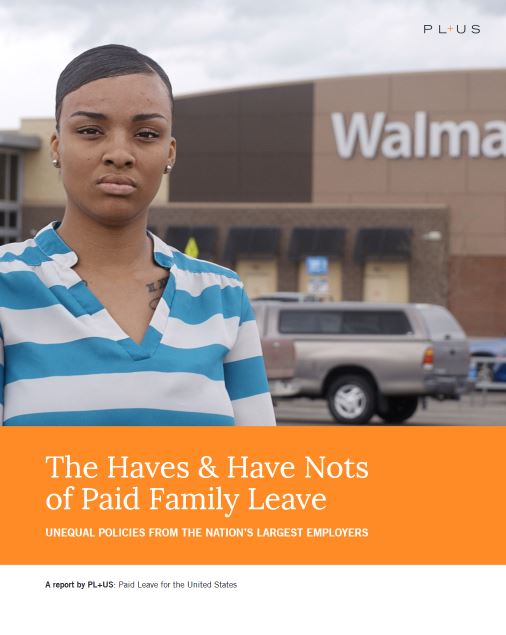
SAN FRANCISCO, Calif. – Today,
Paid Leave for the United States released their
second report on paid family leave policies at the top employers in the U.S. The new report,
“The Haves and Have Nots of Paid Family Leave,” examines the differences in policies between corporate and low-wage employees at the same company. The findings are stark: many of the largest employers in the United States provide significantly more paid family leave to corporate employees, while offering little — or nothing at all — to hourly, field, and part-time workers.
Of the 22 confirmed corporate policies in the report, seven companies were transparent about the unequal paid family leave they are providing to lower-wage workers: AT&T, Darden Restaurants, McDonalds, Starbucks, Supervalu, Walmart, and Yum!Brands (Taco Bell, Pizza Hut). An additional four companies confirmed that their policies left out parents who are part-time workers: Amazon, Marriott, Nike, and Toys R Us.
“The children of low-income working parents deserve just as much bonding time as the children of corporate executives,” said Katie Bethell, Founder and Director of Paid Leave for the United States. “It is inhumane that one in four U.S. women goes back to work less than two weeks after having a baby. We need corporate and public policies that ensure everyone has the time they need to care for their families.”
Starbucks has one of the most unequal policies, providing 18 weeks of fully-paid leave for new mothers and 12 weeks fully paid for new fathers in corporate headquarters, but only six weeks for barista birth moms and nothing for barista dads or adoptive parents. Starbucks employs around 5,000 people in its corporate headquarters and around 150,000 in the stores, so their highly-touted policy only benefits 3% of their total U.S. workforce.
The nation’s largest private employer, Walmart, is another example — the company provides twelve weeks of paid leave for corporate employees, and 6-8 weeks partially paid leave to full-time hourly employees. And while Yum Brands! (Taco Bell, KFC, Pizza Hut) employees in corporate headquarters get 6 weeks paid family leave, hourly employees who work at the restaurants receive no paid family leave at all.
“Like so many moms today, I work hard to support and care for my family, said Liz Loudermilk, a Walmart associate in South Carolina and member of Our Walmart. “I’m due to give birth to our second child in November. Even though Walmart is the largest private employer of women in the U.S., they don’t offer even a paid day off when you have a child. I’m worried I’ll have to return to work too soon after my baby is born.”
In addition, many companies are still not transparent about whether their policies are equal for different classes of employees. More than a third of the top retail employers are not transparent about their paid family leave policies: Trader Joe’s responded to the research inquiry to say that they would not be transparent with this information, and Albertsons, Citigroup, Costco, Gap, H&M, Kroger, Neiman Marcus, Rite Aid, Walgreens, Wegmans, and Whole Foods did not respond to any requests for information on their policies.By comparison, some companies are finding ways to establish fair and equal policies. Ikea leads the retail industry, offering up to four months of paid parental leave to all 14,000 hourly and salaried employees. Levi’s and Nordstrom have also made recent announcement about parental leave policies that apply equally to their retail staff as well as their corporate headquarters: Levi’s offers up to 16 weeks of paid family leave for birth mothers and 8 weeks for other new parents, and Nordstrom offers 12 weeks for birth mothers and 6 weeks for other new parents. In the financial sector, Bank of America, Wells Fargo and JPMorgan Chase provide equal paid leave to all their employees, both hourly and salaried.
Employees at companies highlighted in the report are sharing their experiences and advocating for policy changes that benefit all employees. You can find out more about their campaigns
here.
 SAN FRANCISCO, Calif. – Today, Paid Leave for the United States released their second report on paid family leave policies at the top employers in the U.S. The new report, “The Haves and Have Nots of Paid Family Leave,” examines the differences in policies between corporate and low-wage employees at the same company. The findings are stark: many of the largest employers in the United States provide significantly more paid family leave to corporate employees, while offering little — or nothing at all — to hourly, field, and part-time workers.
SAN FRANCISCO, Calif. – Today, Paid Leave for the United States released their second report on paid family leave policies at the top employers in the U.S. The new report, “The Haves and Have Nots of Paid Family Leave,” examines the differences in policies between corporate and low-wage employees at the same company. The findings are stark: many of the largest employers in the United States provide significantly more paid family leave to corporate employees, while offering little — or nothing at all — to hourly, field, and part-time workers.










